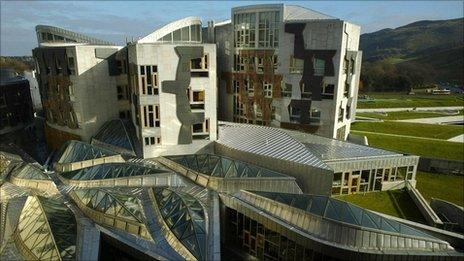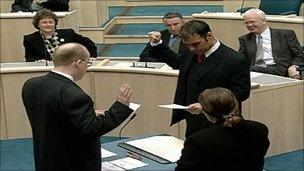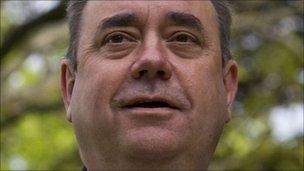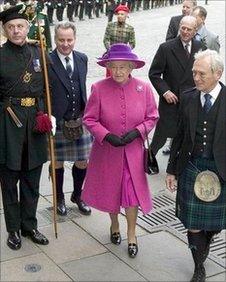Scottish election: What happens next?
- Published

The SNP will form Scotland's first majority government after a historic win at the Holyrood election - but how and when does the new government and parliament get up-and-running?
Here is a guide to what happens next.
9 May
The first day for registration of members at Holyrood - most MSPs are expected to start turning up from today.
10 May
The Kirking of parliament takes place.
This is a traditional, ecumenical service at St Giles Cathedral, in Edinburgh, on the eve of the first sitting of the new parliament.
Those attending will include the newly elected MSPs, faith representatives and other guests.
The Very Rev Gilleasbuig Macmillan, who led the Kirking ceremonies in 1999, 2003 and 2007 will again lead the service.
11 May
The new session of parliament opens, with the oath-taking of MSPs and presiding officer elections the main order of business.
All 129 MSPs are sworn in during the morning, while one of their number becomes presiding officer, resigning their party-affiliation to take up the post.
The PO is elected in a ballot of MSPs.
If a candidate wins more votes than the total number received by all other candidates and the total number of votes cast is more than a quarter of the total number of seats in parliament, that candidate will be elected.
If there is no outright winner for presiding officer, successive rounds of voting will be held, with the candidate receiving the fewest votes in each round being eliminated until one is left.

Tommy Sheridan swore an oath of allegiance to the Queen with a clenched fist in 1999
Alex Fergusson, presiding officer in the last parliament, stays in the post until a successor is elected.
MSPs are sworn in by taking the oath, which states: "I do swear that I will be faithful and bear true allegiance to Her Majesty Queen Elizabeth, her heirs and successors, according to law. So help me God."
Members may also take an affirmation, excluding the final sentence from the oath. Both been taken in a variety of languages in the past, including Gaelic and traditional Scots.
Not all members respect the process - in 1999, Socialist Tommy Sheridan took the Oath as he held a clenched fist in the air.
Any member refusing to take the oath or affirm is banned from parliamentary proceedings and their pay withheld and, if not taken within two months, is thrown out as an MSP.
Two deputy presiding officers must also be elected by parliament.
12-16 May
The parliamentary bureau is formed.
This is a group made up of MSPs from the main parties, which makes decisions on parliamentary business.
The new presiding officer will invite nominations from party leaders. Traditionally, the Scottish government of the day appoints a minister for parliamentary business.
One of the bureau's first tasks is to look at the sitting days, recesses and public holidays for parliament.
17 May
The bureau is likely to meet to discuss timetabling issues.
18-19 May
MSPs are likely to be asked to vote in the next first minister, with SNP Alex Salmond the only realistic candidate.
All applicants for the job, which usually include opposition party leaders, make a speech before voting begins.

Alex Salmond is the only realistic candidate for first minister
A candidate is successful if they win more votes than the total number received by all other candidates and the total number of votes cast is more than a quarter of the total number of seats in the parliament.
Where there is only one candidate, MSPs are asked to vote or abstain and, if the candidate obtains a simple majority, he or she will be declared as the parliament's nomination.
Where there are two or more candidates and none gains an absolute majority in the first vote, successive rounds of elimination voting are held.
The first minister will then be asked to nominate a ministerial team, which must be agreed by parliament, with the approval of The Queen.
If, on the 18th, the first minister is elected, approved by the Queen and receives the seal of office in quick succession, ministerial elections can be held at Holyrood the same day.
25-26 May
Elections for the Scottish Parliament Corporate Body are held.
Like the bureau, this is a group of MSPs and essentially functions as Holyrood's management team, keeping an eye across everything from IT facilities to supplies of bottled water.
Should ministerial nominations not take place in the proceeding week, they would be held on the 25th, pushing the corporate body election to the following day.
1 June
This is the day by which a first minister must be appointed, as laid down by law in the Scotland Act.
Failure to meet the deadline would result in a fresh election being held.
2 June
The inaugural first minister's question time of the new parliament is expected to be held.
8-9 June

The state opening of the Scottish Parliament is a grand affair
MSPs will consider motions to establish the Scottish Parliament's cross-party committees, which have a wide-ranging role which includes scrutinising legislation and holding inquiries.
Some committees are mandatory, namely the European and external relations, equal opportunities, finance, public audit, public petitions, standards and subordinate legislation.
Committees need to have between five and 15 members, with their make-up based on the proportion of seats each party has overall.
The d'Hondt formula is used to calculate the allocation of committee convenerships.
At the earliest, the new committees could probably start meeting during the weeks beginning 13 June and 20 June.
10 June
The deadline for electing the Scottish Parliament Corporate Body.
13 June
Crucial Holyrood committees, including the finance committee, must be established by this date.
1 July
The Queen officially opens the new session of parliament, with a speech to MSPs and other guests in the Holyrood chamber.
It is a large, set-piece event, during which the Crown of Scotland, which dates back to the 15th century, is processed to the parliament.
Members of the public also line the Royal Mile, outside Holyrood for the "Riding".
It is a traditional procession which marks a centuries-old Scots tradition that parliament and the Scots people work together in public partnership.
The last state opening of the Scottish Parliament, in 2007, came on the same day as the Glasgow Airport terror attack